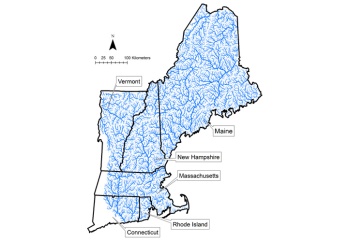
NH GRANIT, a mapping agency for the state based at the University of New Hampshire, is receiving close to $1 million from the N.H. Department of Business and Economic Affairs (BEA) to inventory and map statewide broadband coverage that is currently available as well as what is proposed for the state’s businesses, educators and citizens.
“The information we pull together for this project is important because it will help identify areas in the state that are served by current technologies as well as those that could use improvement or are completely lacking, which can really impact businesses and the public, especially for those living and working in underserved areas,” said David Justice, project director.
The mapping effort will collect primary data from roughly 32 fixed broadband providers who currently offer service in the state, as well as the addresses in neighborhoods receiving broadband. Specific house addresses will not be publicly available on the maps but will be converted into broader road segment data. That information combined with service data and other geospatial data available from NH GRANIT will be used to develop state-level broadband availability maps, identifying areas in the state that are being served by current technologies as well as areas that are underserved or don’t have any coverage at all.
"Accurate and available mapping of where broadband exists in our state is crucial for the well-being of our citizens and businesses," said Taylor Caswell, BEA commissioner. "As the state continues to allocate resources toward these important projects, showing where broadband exists and, more importantly, where it needs to go, will guide us in future decisions and provide enhanced communication opportunities to our stakeholders."
The NH GRANIT team will collaborate with BEA, consultants Scott Valcourt, Northeastern University and Carol Miller, National Collaborative for Digital Equity, as well as regional and local stakeholders.
NH GRANIT System is located at UNH’s Earth Systems Research Center and serves as the state geographic information system clearinghouse — creating, managing, analyzing and mapping all types of data.
The UNH Institute for the Study of Earth, Oceans, and Space (EOS) is UNH's largest research enterprise, comprising six centers with a focus on interdisciplinary, high-impact research on Earth and climate systems, space science, the marine environment, seafloor mapping and environmental acoustics. With approximately 100 principal investigators managing more than 400 individual grant awards, and with annual expenditures exceeding $77 million, EOS fosters an intellectual and scientific environment that advances visionary scholarship and leadership in world-class and graduate education.
-
Written By:
Robbin Ray ’82 | UNH Marketing | robbin.ray@unh.edu | 603-862-4864




















































